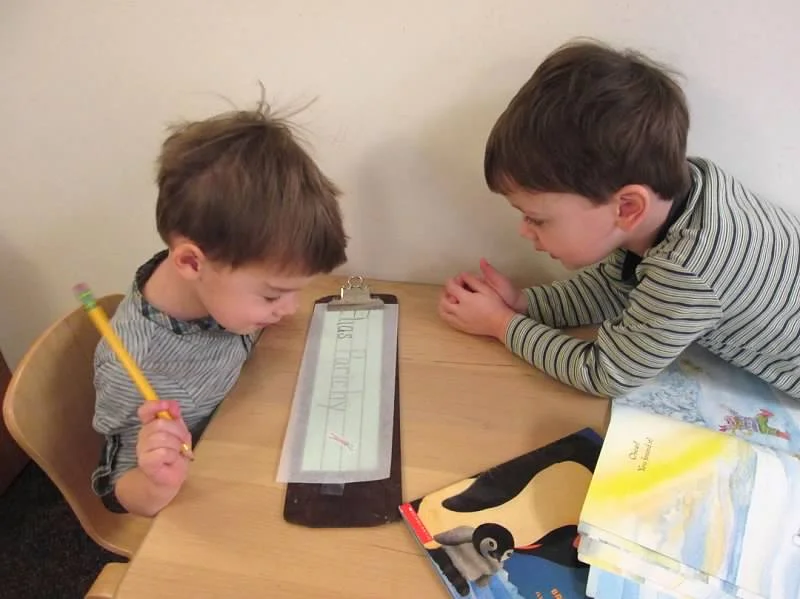Our classrooms are deeply influenced by the teachings of Maria Montessori and Magda Gerber
In our infant programs the staff follows the philosophy of Resources for Infant Educarers, as developed by Magda Gerber. The core of RIE is the belief that parents and caregivers respect an infants ability to initiate their own learning and be given the freedom to safely explore their world with as few limitations or confinements as possible.
The RIE philosophy is based on a few simple principles:
- Infants have time for uninterrupted play, freedom to explore their environment and to interact with other infants.
- They are active participants in all of aspects of their own care.
- Caregivers use observation to set appropriate limits and expectations to support their understanding of each individual infant.
- The infant environment is physically safe, emotionally nurturing and cognitively challenging.
A Montessori classroom is an environment in which children have the freedom to choose their work and set their own pace within an engaging, well organized, sequenced curriculum.
All of our Toddler groups and Preschool classrooms, with the exception of the preschool program at Laurel Village, are led by trained Montessori teachers. Laurel Village uses a High Scope curriculum. The Montessori classroom includes activities for the areas of language development, math, science, geography, art, sensorial materials, and practical life or daily living skills. Each area of curriculum is organized from the concrete and simple to more complex attributes. Materials and activities are aesthetically pleasing, generally made with natural materials and hands-on, providing children with the opportunity to learn sensorially, as well as cognitively. Within this organized and creative environment, children are guided to become independent and self-disciplined and to experience the joy of learning and discovery.
A Short History:
The philosophy of Montessori education began with Dr. Maria Montessori (1870-1952). Dr. Montessori began her career as the first woman doctor in Italy and began working with children in the psychiatric wards of Rome in the late 1800’s. Through her experiences there, she formulated her observations of the importance of training the hand to develop the mind through sensory materials.
As a result of Dr. Montessori's observations and work, her children made tremendous progress and were able to participate in the state education exams. The question was raised that if these children could be educated to the level of a “normal” child, what progress could a normal child make if given the same sensorial education. Through many years of working with children from many cultures and countries and diverse circumstances throughout the world, Montessori developed what she termed her “method” of education.
Dr. Montessori believed, as current research supports, that during the first few years of life, children acquire the greatest percentage of their knowledge. This learning comes through the five senses which must be developed to their fullest. She believed that children have a spontaneous interest in learning, thus she established a classroom procedure based on inner motivation, reinforcing their natural awe and excitement toward the world around them.
Montessori also described what are called the “sensitive periods”. These periods are comparable to Piaget’s theory of the development of the child’s intellect. Montessori saw children developing through progressive stages of growth, each stage building on the previous one. During each “sensitive period”, new cognitive learning is acquired and integrated into the old. The Montessori classroom is therefore organized in such a manner that children move from the simple to the complex. Each beginning activity relates to another, yet more sophisticated. Children are able to progress, following their own timetable, through many levels of complexity.
Dr. Montessori recognized that the most valid impulse to learning is the self-motivation of the child. The prepared environment of a Montessori classroom is structured so as to attract children and hold their interest. The activities and materials are self-corrective, sensorial, concrete, and aesthetic.
At our Montessori schools, children are introduced to a wide variety of experiences and activities that help them grow intellectually, socially, and spiritually. Supported by loving adults and developmentally appropriate materials, they have the opportunity to discover their own potential. The Montessori method encourages children to master their environment as well as develop respect for people and the wider world around them.
